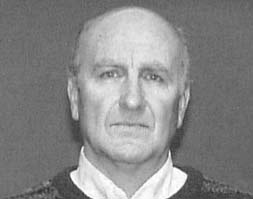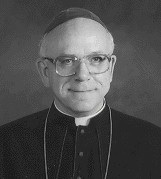Daniel Croteau Murder
June 6, 2009
http://croteaumurder.blogspot.com/2009/06/part-6-what-church-knew-about-richard.html
[with links to parts 1-5]
What did the Springfield Diocese know about the pedophile tendencies of former priest Richard Lavigne (pictured above)—and when did church officials know it? That question, of course, has been a major point of contention after the church faced nearly 40 claims against him since the 1990s—and especially after it was revealed that he is the prime suspect in the 1972 murder of 13-year-old altar boy Daniel Croteau.
The Diocese has maintained that the first complaint it received was in 1986, claiming that it requested a mental health evaluation of the priest in that year, shortly after two complaints surfaced, and "the result of that evaluation was that Father Lavigne was not a threat to re-offend and he could, with counseling, continue his duties," according to a diocesan statement.
Despite's the Diocese's insistence that it didn't know about allegations that Lavigne was a child molester until 1986, Carl Croteau Sr. says he told the late Father Leo O'Neil about police investigators' suspicions about sex abuse and murder in 1972, when he was associate pastor of St. Catherine's.
 |
"Father O'Neil was sitting in the front room, and I remember how he slumped in a chair when I told him, and he asked me if I thought Father Lavigne was capable of murder ," Croteau said. "At the time, it was all so unbelievable. We lost our son. One of our best friends is accused of his murder. It was just too much. Father O'Neil saw how tense I was and suggested I go out and get a couple of beers to calm down."
Moreover, retired State Police officer Jim Mitchell says that his colleague, the State Police Lieutanant James Fitzgibbon, who died in 1982, briefed diocesan officials about the molestations shortly after the murder.
"We had an obligation to show our cards," said Mitchell. "Fitzy had a sit-down with them. Everything we knew, we told them."
In 1993, there were claims that the church even knew about abuse allegations in the late 1960s: Maurice DeMontigny, a longtime lay religious officer in the diocese, who is an uncle of two other accusers, filed an affidavit in 2003, repeating his 10-year-old assertion that in 1968 St. Catherine's pastor Thomas Griffin, "very upset and breathing hard," told him that someone in the parish had come to him with a complaint that Lavigne had molested his sons, and "in all likelihood" the information was passed to then-Bishop Christopher Weldon. He also stated that in 1968 he, Griffin, and O'Neil "were disapprovingly talking about Father Lavigne's close activities with boys." According to the diocese, there was no evidence of a complaint by Griffin, and a source told the Catholic Observer newspaper that O'Neil had denied that he ever discussed Lavigne's activities with boys after he arrived at St. Catherine's in 1968.
Diocesan documents released in 2003 revealed that faculty members at Our Lady of the Angels Seminary in Albany, NY, were concerned about the man's emotional stability as early as 1966, when he was a student there.
There are also allegations that church documents relating to abuse claims were destroyed. Father James Scahill, an East Longmeadow pastor who was questioned by Stobierski in a September, 2003 deposition, said that Springfield Bishop Thomas Dupre at a March 2002 meeting of the diocesan presbyterial council, gleefully "announced that fortunately for the church of Springfield," in the 1970s Weldon had destroyed files that might have contained records about sexual abuse by clergy. Weldon died in 1982. Dupre, under oath, denied the he made this comment. But Dupre admitted that he had assigned the Rev. Richard Meehan, who had been removed from parish work for sexual abuse, in charge of the diocese archives in 2000.
In a sensational development in February, 2004, Dupre, pictured below, stepped down from his post a day after two men accused him of raping them as boys beginning in the 1970s, raising questions about what many saw as his lackadaisical response to the sexual abuse scandal. Lavigne was officially stripped of his collar that spring, after critics, including Father Scahill, accused Dupre of dragging his feet on the defrocking process for years.
"The church covered it up, passed [Lavigne] from parish to parish, and he went on to abuse more kids," said Carl Croteau Sr. as his wife, Bunny, nodded in agreement.
But through three decades of both despair over the loss of their son — and brief glimmers of hope that Danny's killer would be arrested — he and his wife have remained active at St. Catherine's, despite their belief that the Springfield Diocese knew full well that Lavigne was a sexual predator, but still allowed him to serve as a priest for decades. "It's hard," he says. "But we've been able to get through this because of the fact that it's our church. Nobody should come between you and God. Nobody. Why should we give up something we love because of a few bad people?"
Remarkably, the Croteaus are able to speak quite calmly about a frustrating investigation, giving off a vibe of hope, not bitterness, over the whole affair. This wasn't always the case. There was the time Carl Sr. happened to see Lavigne in downtown Springfield. Croteau is a rail-thin man with an arthritic back, and he has had one lung removed. But a friend could barely restrain him. "It isn't worth it, Carl," he was told, and Croteau calmed down. His daugher, Catherine Powers, recalled Lavigne's legal battle in 2003 to avoid his obligation to register with the Chicopee Police as a level three sex offender, the most severe rating. Lavigne lost his appeal and registered, but the police wouldn't post the notification in his neighborhood.
"I wanted to put up signs all around his block warning everybody," she said. But she didn't. The Croteaus have their moments, but they ultimately maintain their composure. They are not angry people. "We just want to make sure he isn't able to do it again," said Bunny.
When I first spoke to Carl and Bunny in 2003, it was evident that they had accepted Danny's death, and when the conversations got less intense, it seemed that they would rather talk about their grandchildren and great grandchildren than their son's murder. They proudly showed off their new grandson Thomas, which was Danny's middle name. Entering the room to look at Thomas was his sister, 11-year-old Danielle, who was named after Danny. The couple doesn't like to dwell on the negatives. They focus on the positives. They had named their youngest son after the late actor Danny Thomas because of his work on behalf of St. Jude, the patron saint of hopeless causes, and they point out that sometimes seemingly unsolvable cases are ultimately solved. They remain confident that their search for closure isn't a quixotic quest.
But sources familiar with the case say that an indictment isn't likely unless a new witness comes forward, especially since the other witnesses had waited decades before contacting investigators. Danny Croteau was last seen on April 14 at 4 p.m. walking from his home on Ferncliff Avenue toward Wilbraham Road wearing a tan suede jacket, blue corduroys, and high-top canvas sneakers. R.C. Stevens, the private investigator hired by The Republican newspaper, determined that Danny planned on attending a party in Sixteen Acres the evening of his murder. He is trying to establish a timeline of the final night of his life, but progress has been slow. He is looking for anyone who had attended the party, or who has knowledge of the pedophile ring he believes Danny had contact with—a group of priests and other deviants that he also believes that Lavigne was a part of.
Forever 13
 |
Croteau Sr. remembers his final conversation with the boy as if it happened yesterday. He saw his son on a neighbor's lawn playing kickball with friends after school that Friday. "I had brought home an old rug that we were going to put in the back porch," he says, and "I asked him to help his mother put the rug down. He said, 'Sure, dad.' "
It was the last conversation they had. He was out the door, but he will never be out of their lives.
When he didn't come home at night, Bunny started calling people, including Lavigne, who said he hadn't seen Danny. He was supposed to go to a Boy Scout meeting that night, but he didn't. For some reason, a terrified Bunny thought of water, probably because her son had talked all week about the start of fishing season, which was the next day. Although Danny hadn't taken his fishing pole with him, his father got in his car and checked the area ponds anyway. They called police at midnight. After a sleepless night, they considered the possibility that the boy stayed out all night fishing, but dismissed it. None of the family's angling gear was missing. And Danny always came home. Croteau Sr. went on another tour of neighborhood fishing holes in the morning. No luck.
Then, shortly before 11 a.m., police arrived at the Croteau house and told him that his son was dead. Why, how, and when Danny went to that fishing spot under the Route I-291 bridge in Chicopee remains a mystery.
Longtime Sixteen Acres residents certainly haven't forgotten about the murder. At the time, it was quite a shock to us. For kids, the old and bothersome "come home when the streetlights come on" rule was strictly enforced by parents for a while. But, after two newspaper stories that week appealing for the public's help in solving the crime, there was no arrest, and most people went on with their lives. In the spring of 1972, Fridays for us meant a game of Wiffleball, followed by The Brady Bunch and The Partridge Family. But Fridays for the Croteau family meant the start of another weekend that their son wasn't coming home. Spring drifted into summer, and years accumulated into decades. The case made headlines in the 1990s, and then talk quieted, only to resume every few years. Occasionally, neighbors pop into the Croteau house and offer their support: maybe there will be an arrest.
The Croteaus still dream of Danny, forever 13 with dirty blond hair and blue eyes. Bunny has a recurring nightmare: hearing her son calling, but she can't find him. In 2003, Danny sat at the edge of Catherine's bed in a dream, asking her to wear a blue ribbon for victims of molestation. So she started a ribbon campaign, and she wore hers when the clergy sex abuse scandal in western Massachusetts focused on former Bishop Dupre, who wasn't prosecuted by the D.A.'s office because the statute of limitations on the two claims had run out.
And Carl still talks to his youngest son. Whenever he drives over the Governor Robinson Bridge, he asks Danny to somehow point the finger at his killer, to steer authorities toward an undiscovered clue or witness.
"There is still an ongoing investigation, and I know that there are a few things that have come up. Hopefully, they'll help [investigators] out. What they are I don't know," says Carl Sr. "All we know is that the case is still open, and maybe there will be revelations that will shock everybody."
Any original material on these pages is copyright © BishopAccountability.org 2004. Reproduce freely with attribution.